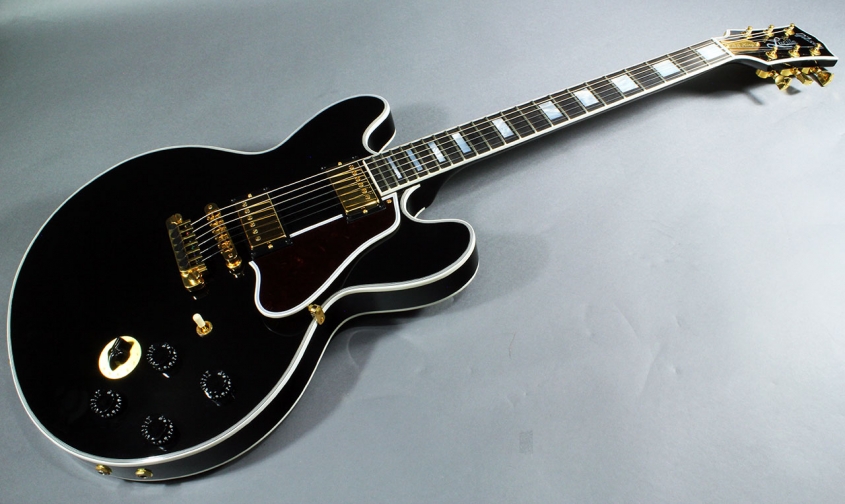| Serial Number | 01124719, Made in USA. Produced April 22, 2004 |
| Pricing | $1950 CDN with case. SOLD |
| Neck | 3-piece Maple neck with bound ebony fingerboard, pearl block markers. Multiple-layer binding on head. Gibson logo and Lucille script logo inlaid in pearl on front of head. Standard Gibson 24.75″ scale length. |
| Frets | 22 medium-jumbo frets with very litte wear. |
| Body | Maple laminate body with center block and no F-holes, 4-layer binding on top 2-layer on back., |
| Finish | Gloss Black (“Ebony”) nitrocellulose laqcuer, in excellent shape. |
| Hardware/electronics | Gold hardware. Grover roto-matics with metal Keystone buttons, ‘B.B. King’ engraved gold-plated trussrod cover. Two humbucking pickups, individual volume and tone switches, varitone selector, pickup selector, mono and stereo output jacks. Gold tune-a-matic bridge and fine-tuner stop tailpiece. Bound tortoise pickguard. Rear electronics access plate – with no F-holes, there’s got to be some way to get the parts inside! |
| Playability/Action | This instrument plays very well, and the action can be set to wherever your playing style requires. |
| Case | Original Gibson hardshell case included. There’s something about an ebony fingerboard that adds a little more clarity and definition. |
| Comments | The Gibson B B King Lucille is a wonderful and relatively rare instrument. This example is in excellent condition with very little fret or finish wear. The fully closed body reduces the possibility of feedback, and the access plate on the back allows for a much easier time servicing controls – on traditional F-hole bodies, all the parts go through the pickup openings or the F-holes, so service (which will always eventually be required) can be a very time-consuming and frustrating task. The fine-tuner tailpiece is actually a really good idea for quick tuning tweaks, bypassing the backlash effect that all geared tuning gears have – this effect is why you need to always tune up to a note.
This instrument is wired as mono and stereo. The mono jack works just like a normal guitar. The stereo jack requires a special cable (standard stereo 1/4″ jack on one end, two separate mono 1/4″ jacks on the other) and allows you to send each pickup to a separate amplifier or mixer channel. |
You can preview our videos now on Our YouTube Channel!
You can now Visit our Facebook page!








